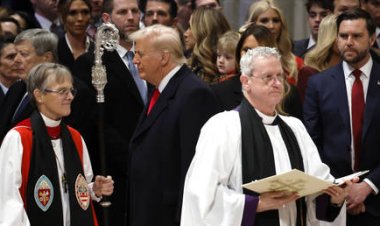Get to Know the Under-the-Radar Conservatives Who Could Enable Trump to Achieve Dictatorship from Day One
The former president's promise to implement swift and forceful executive measures makes his choice for acting attorney general particularly crucial.

However, should Trump win the presidency again, this could quickly become one of his top priorities.
He has made it clear that he intends to leverage the power of the Justice Department in unprecedented and legally questionable manners starting on his first day in office. To effectively do this, he will likely require a compliant official to temporarily lead the department while his permanent nomination for attorney general goes through the Senate confirmation process.
This "acting" attorney general will need to be someone specific. Federal regulations restrict who can be appointed as an acting department head, meaning Trump would have to identify an individual already occupying a senior government role.
Most senior DOJ officials are unlikely candidates; Trump and his top aides wouldn’t trust them to enact his radical vision for the department. Yet, there are a few lesser-known officials in the government who might meet Trump’s loyalty criteria and also qualify under federal law to serve as acting attorney general.
One potential candidate is Andrew Ferguson, a Biden-appointed Republican trade commissioner who previously clerked for Justice Clarence Thomas and has a close relationship with a key Trump adviser. Another option is Curtis Gannon, a seasoned Justice Department staffer whom Trump appointed to a different acting role during his first term.
Other candidates include Prim Escalona, a lesser-known conservative federal prosecutor in Alabama, and Joseph Cuffari, a controversial inspector general appointed by Trump six years ago who remains in his position.
Whoever Trump selects will likely make one of his initial and most significant decisions in a second term. This individual will be responsible for executing a rapid series of actions that Trump envisions to reaffirm his promise to govern with an iron fist from Day 1.
For example, Trump has indicated that he plans to terminate and potentially prosecute special counsel Jack Smith on his very first day. He has also vowed to appoint “a real special prosecutor” to investigate the Biden family and to initiate mass deportations, possibly using the Insurrection Act. Additionally, he aims to reinstate the travel ban he established in 2017, which prohibited entry from several majority-Muslim nations. Furthermore, he intends to reissue an executive order he enacted late in his presidency, granting him more power to replace federal employees with political appointees.
Much of this agenda will necessitate oversight or legal backing from the Justice Department, which is why GOP Vice Presidential Nominee JD Vance highlighted the attorney general role as crucial in a potential second Trump administration.
“The most important person in government, I think, after the president, for this cycle, is going to be the attorney general,” Vance stated at a recent campaign event near Atlanta. “We really do have to clean house. … We need a strong, smart, courageous attorney general.”
However, the process of cleaning house can be time-consuming. Traditionally, an incoming president’s attorney general is not in place on the very first day. Depending on the dynamics in the upcoming Senate, Trump’s nominee may face a drawn-out confirmation struggle. While this process could take weeks or months, an acting attorney general could implement Trump’s agenda immediately.
This is a strategy Trump has previously employed. During his first term, he often allowed federal agencies to be led by acting officials for extended periods.
“It's easier to make moves when they're acting,” Trump noted in February 2019. “I like acting because I can move so quickly. It gives me more flexibility.”
**Lessons from the Travel Ban Showdown**
Historically, the role of acting attorney general was perceived as a temporary placeholder—typically a holdover from the previous administration who served for a few weeks until the new president's selection was confirmed.
This changed dramatically when Trump took office in 2017. At that time, Deputy Attorney General Sally Yates, one of President Barack Obama’s appointees, was still in her position while Sen. Jeff Sessions awaited confirmation as attorney general. Trump aimed for immediate action. Just a week into his presidency, he enacted a sweeping executive order barring entry to the U.S. from citizens of seven predominantly Muslim nations.
The travel ban—often dubbed the "Muslim ban" by critics—triggered widespread outrage, resulting in thousands of activists rushing to airports, ready to protest and provide legal assistance to affected travelers. Within hours, numerous lawsuits were filed across the country to halt Trump's order, which fulfilled a campaign promise to take decisive action against perceived security threats associated with Muslim migrants.
With the Justice Department temporarily lacking confirmed appointees, Yates felt what she called “ultimate responsibility” to defend the government in these lawsuits. She refused to advocate for Trump’s executive order, expressing her doubts about its legality.
“I am responsible for ensuring that the positions we take in court remain consistent with this institution’s solemn obligation to always seek justice and stand for what is right,” Yates wrote.
Her stance led to a frantic effort by White House Counsel Don McGahn to find someone willing to defend Trump’s order. Ultimately, the Obama-appointed U.S. attorney from Alexandria, Virginia, Dana Boente, accepted the task.
“They reached out to me and asked if I would,” Boente, who had served in various DOJ capacities for over three decades, recalled. “I just thought … if there's a defense that can be presented, it’s our duty to defend it.”
That same evening, Trump dismissed Yates and appointed Boente as acting attorney general, stating that Yates had “betrayed the Department of Justice.”
This incident was a stark reminder for many Trump-sanctioned attorneys that long-standing officials from both Republican and Democratic administrations may not be trusted to carry out Trump’s more contentious policies, and that leadership changes in an agency can complicate the transition process.
**Legal Boundaries for Appointing an Acting Attorney General**
Trump can’t appoint just anyone as acting attorney general. Under a 1998 statute known as the Vacancies Reform Act, his options are restricted to two specific pools. One consists of any Senate-confirmed appointee currently serving in the executive branch, while the other includes anyone who has worked at the Justice Department for 90 days within the year leading up to the vacancy, provided they were compensated at the GS-15 level or higher—approximately $164,000 in the Washington area.
“Trump 2.0 could … find Republican commissioners and board members at, say, the Securities and Exchange Commission, and they will qualify, I believe, under the Vacancies Act,” said Stanford Law Professor Anne Joseph O’Connell. “Now, the Vacancies Act has never been used that way.”
However, if Trump is inaugurated next January, he will likely find a limited number of his appointees from his first term still in office, as many resigned shortly before or after he left. While a significant number of high-earning career DOJ employees remain, it’s uncertain whether Trump will believe that such individuals, perceived as part of the "deep state," would exhibit the loyalty he desires.
“I would think he’s going to be looking for people he’s guaranteed to be a loyalist,” Boente commented, acknowledging the difficulty in satisfying Trump’s demands. “It's hard to imagine, given what they would like to do, how they'll accomplish that task.”
**Potential Candidates Emerge**
Several names of possible acting attorney general candidates are circulating among Republicans, both allies and critics of Trump. Some are seen as strong Trump supporters, while others are known for robust defenses of executive power that could support any president's agenda.
One possibility is Andrew Ferguson, currently a Federal Trade Commission member. Although appointed by Biden, Ferguson was confirmed earlier this year. He boasts a strong Republican background, having clerked for Thomas, served as Virginia's solicitor general, and worked as nominations counsel to Sen. Lindsey Graham during Justice Brett Kavanaugh's tumultuous confirmation hearings.
Ferguson is reportedly “super close” with confrontational GOP lawyer and Trump supporter Mike Davis, a key figure Trump has publicly promised to appoint to a high-ranking position, though Davis may not meet the legal qualifications to serve as acting AG.
However, Ferguson has some potential challenges: he has never worked at the Department of Justice and spent two years as chief counsel to a GOP senator Trump frequently criticizes, Mitch McConnell.
Installing someone from a different agency, like Ferguson, could raise legal questions regarding the applicability of their current role to the acting attorney general position, but those issues might not be resolved by courts if the appointment is brief, according to O’Connell.
Another possible candidate is Curtis Gannon, currently a Deputy Solicitor General. Having clerked for the late Justice Antonin Scalia, Gannon became acting head of the prestigious Office of Legal Counsel under Trump, where he reviewed initial Trump executive orders and endorsed the travel ban.
“Curtis is the most true-to-the-Constitution person I know, in the sense that if the president tells them to do something that is legal, he will do it,” said one Trump-appointed DOJ official who wished to remain anonymous.
While Gannon is trusted by Trump’s team and possesses ample DOJ experience, whether this will serve as an advantage or disadvantage during Trump's second term remains uncertain.
A third avenue involves appointing a current U.S. attorney as acting AG, as Trump did after Yates' refusal to back his policy. His team would likely prefer to avoid many of Biden's appointees, but some U.S. attorneys are career officials and may have served during Trump’s administration.
One option is Prim Escalona, the U.S. attorney for the Northern District of Alabama. Appointed by Attorney General Bill Barr in 2020, she has a solid Republican background, including roles in the Justice Department’s Office of Legislative Affairs and Office of Legal Policy, as well as a clerkship with conservative judge William Pryor Jr.
“I wouldn't pick Prim if you're trying to, like, do shenanigans,” noted the same Trump-appointed attorney mentioned earlier.
Escalona has also exhibited independent judgment; she did not sign onto a recent DOJ lawsuit challenging Alabama's voter purge policies, while two U.S. attorneys in Virginia did endorse a similar challenge.
Biden did not nominate anyone to replace Escalona or approximately one-fifth of the country's 93 U.S. attorney posts. The lack of nominations likely stems from a standoff between Biden and Republican senators in those states, who hold veto power over nominees due to the Senate Judiciary Committee’s “blue slip” practice.
Another intriguing potential choice for acting AG is Joseph Cuffari, the 64-year-old Inspector General for the Department of Homeland Security. He was nominated and confirmed by Trump in 2019 but has become a contentious figure in the current administration, releasing reports critical of Biden's immigration enforcement policies.
Cuffari's tenure has been contentious, prompting other inspectors general to recommend Biden consider firing him over alleged misuse of taxpayer resources. Despite pressure from Democrats to oust him, if Biden fails to act before leaving office, Cuffari would be eligible for the acting AG role. One significant concern is that he lacks a law degree and does not possess the legal background typically expected of confirmed attorneys general.
Ferguson, Gannon, Escalona, and Cuffari, or their representatives, did not respond when asked about their willingness to accept the role of acting AG.
**Strategies for Senate Confirmation**
Trump and his allies could expedite any potential resistance to his policy agenda within the Justice Department by urging the Senate to confirm his attorney general nomination at an accelerated pace.
The Senate generally takes its time with Cabinet confirmations. For instance, after Trump’s inauguration in January 2017, the Senate confirmed Sessions 19 days later. Merrick Garland, the current AG, was not confirmed until March 10, 2021, while Janet Reno, nominated by Bill Clinton, was confirmed on March 11, 1993, following the withdrawal of another candidate.
AG Eric Holder under Obama and John Ashcroft under George W. Bush each had confirmation periods of about 11 days.
The fastest AG confirmation during a party control change occurred in 1981 when Ronald Reagan’s nominee, William French Smith, was confirmed just two days after taking office.
As Republicans are anticipated to gain control of the Senate next year, a strong victory for Trump could result in a larger GOP majority. The size of that majority could influence the confirmation process, allowing Trump to select a more contentious candidate and secure swift approval.
“There’s always an acting person, right?” Trump transition lead Howard Lutnick remarked on CNN recently, downplaying any concerns about interim leaders remaining in place for long. “They're going to be confirmed reasonably quickly. … If Donald Trump is elected president, he will have a majority in the Senate. He'll be able to get people confirmed.”
The Senate can often conduct some confirmation hearings for Cabinet nominees early in January, even before formal nominations that can only occur after a president takes office on January 20. However, unless Senate rules undergo substantial changes, an immediate vote on Inauguration Day remains unfeasible. Therefore, an acting official is essential due to the inevitable delays in confirming an attorney general.
During his recent appearance in Georgia, Vance underscored that Trump's transition team recognizes the critical importance of the AG position. “That’s one of the things … we’re thinking about,” he said.
Despite Vance’s emphasis on the necessity of a quick appointment, Trump might prefer to have an acting AG for a while. His first term saw him frequently using interim appointments to fill vacancies.
A couple of years into his presidency, over a quarter of Trump's Cabinet was serving in acting roles due to resignations and confirmation delays. Trump appeared to enjoy the flexibility of quickly installing new agency heads. This was evident in the Justice Department as well: after Sessions resigned in fall 2018, Trump appointed Matthew Whitaker, previously the department’s chief of staff, as acting attorney general. Whitaker held this position for three months before Barr was confirmed.
Camille Lefevre for TROIB News
Find more stories on Business, Economy and Finance in TROIB business












